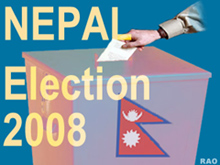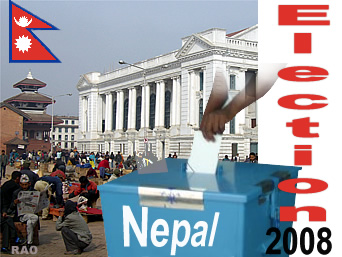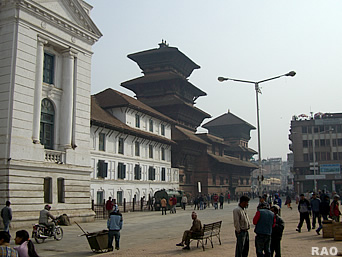 |
|
Respect
for human rights crucial for CA election success
|
 |
02
April 2008 2008 (OHCHR-Nepal)
 |
The
election for a Constituent Assembly is an historic opportunity for the
people of Nepal to turn their hopes for democracy into reality. It is far
more than a competition between diverse political parties.
Those
who will be elected to the Constituent Assembly will be more than representatives
of their own political party: they will be entrusted by the population
with the responsibility of drafting a new constitution that permanently
enshrines the human rights of all Nepalese people. |
|
The
free, fair and transparent election of a Constituent Assembly will therefore
be a success for all Nepalese regardless of their cultural or political
affiliations.
The
human rights relevant to the 10 April election process are not limited
to the right to participate by casting a ballot on Election Day. They include
the right to life and physical integrity, to peaceful assembly, freedom
from intimidation and discrimination, and freedom of opinion and expression.
OHCHR believes that a sincere commitment by everyone to respect these interconnected
and indivisible rights will create an environment in which a successful
and credible election can take place.
It
is clear that not all political actors have made good on their commitments
to refrain from the use of violence in the pre-election period. OHCHR has
Publicationed numerous instances of the use of intimidation, threats and physical
violence by political party cadres. These have included deliberate, and
sometimes fatal, attacks against cadres of other political parties. Clashes
between party supporters have also resulted in sometimes unintended fatalities,
injuries and property damage. OHCHR once again calls upon all parties,
including armed groups attempting to disrupt the election, to denounce
the use of such tactics, and to respect the rights of all to conduct their
activities without obstruction during the remaining days of the campaign.
An
electoral process that fully respects human rights can only be achieved
if all political parties and the government authorities work together to
ensure that all Nepalese people are able to participate without fear of
threats or intimidation. In this regard, OHCHR welcomes the agreement signed
on 1 April by the leaders of three political parties that they will abide
by the electoral Code of Conduct and form a committee to monitor any Code
of Conduct violations. In addition, all those responsible for conducting
the election, or for providing security, must do so impartially.
OHCHR
recommends the following measures to ensure respect for human rights in
order to help create a free and fair environment for the election:
 The Nepal Police should conduct prompt and impartial investigations into
all serious incidents of human rights violations and abuses; The Nepal Police should conduct prompt and impartial investigations into
all serious incidents of human rights violations and abuses;
 Political actors should refrain from exerting pressure on the police in
an attempt to influence or impede the course of these investigations; Political actors should refrain from exerting pressure on the police in
an attempt to influence or impede the course of these investigations;
 Campaign organizers and party leaders should ensure that children do not
participate in political activities that put their safety at risk; Campaign organizers and party leaders should ensure that children do not
participate in political activities that put their safety at risk;
 All actors, whether within the political parties, government or other groups,
should respect the right of all individuals, regardless of gender, ethnicity,
caste or political affiliation, to participate in the election process.
Provisions should be made to ensure the participation of elderly and disabled
people; All actors, whether within the political parties, government or other groups,
should respect the right of all individuals, regardless of gender, ethnicity,
caste or political affiliation, to participate in the election process.
Provisions should be made to ensure the participation of elderly and disabled
people;
 Threats by political actors that they will retaliate against individuals
who vote against instructions, including threats based on false information
that the voting process is not secret, must cease; Threats by political actors that they will retaliate against individuals
who vote against instructions, including threats based on false information
that the voting process is not secret, must cease;
 Political parties should refrain from directing large numbers of youth
to gather in and around polling stations on Election Day, and retract statements
indicating that such youth would be deployed for 'security' purposes. Political parties should refrain from directing large numbers of youth
to gather in and around polling stations on Election Day, and retract statements
indicating that such youth would be deployed for 'security' purposes.
'I
urge all political actors and every Nepali to abide by the electoral Code
of Conduct and ensure respect for human rights during the election process.
With such a commitment, I am confident that a credible and representative
Constituent Assembly will be elected and a historic step taken towards
strengthening democracy and human rights in Nepal,' said OHCHR-Nepal Representative
Richard Bennett.
| Source: OHCHR United Nations Office of the High Commissioner for Human Rights April 2008 |
 |
 |
External
Links |
top
| Links |
 |
 |
 |
External
Links |
|


![]() The Nepal Police should conduct prompt and impartial investigations into
all serious incidents of human rights violations and abuses;
The Nepal Police should conduct prompt and impartial investigations into
all serious incidents of human rights violations and abuses;
![]() Political actors should refrain from exerting pressure on the police in
an attempt to influence or impede the course of these investigations;
Political actors should refrain from exerting pressure on the police in
an attempt to influence or impede the course of these investigations;
![]() Campaign organizers and party leaders should ensure that children do not
participate in political activities that put their safety at risk;
Campaign organizers and party leaders should ensure that children do not
participate in political activities that put their safety at risk;
![]() All actors, whether within the political parties, government or other groups,
should respect the right of all individuals, regardless of gender, ethnicity,
caste or political affiliation, to participate in the election process.
Provisions should be made to ensure the participation of elderly and disabled
people;
All actors, whether within the political parties, government or other groups,
should respect the right of all individuals, regardless of gender, ethnicity,
caste or political affiliation, to participate in the election process.
Provisions should be made to ensure the participation of elderly and disabled
people;
![]() Threats by political actors that they will retaliate against individuals
who vote against instructions, including threats based on false information
that the voting process is not secret, must cease;
Threats by political actors that they will retaliate against individuals
who vote against instructions, including threats based on false information
that the voting process is not secret, must cease;
![]() Political parties should refrain from directing large numbers of youth
to gather in and around polling stations on Election Day, and retract statements
indicating that such youth would be deployed for 'security' purposes.
Political parties should refrain from directing large numbers of youth
to gather in and around polling stations on Election Day, and retract statements
indicating that such youth would be deployed for 'security' purposes.




